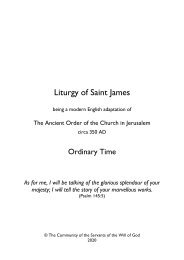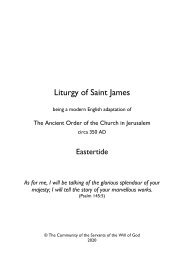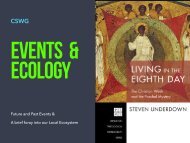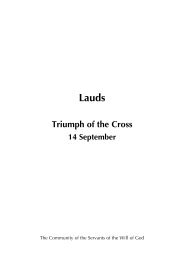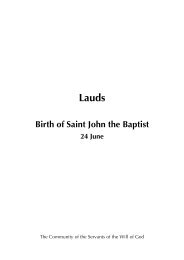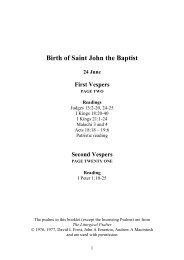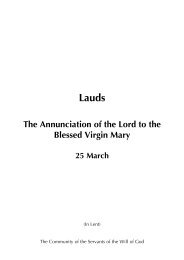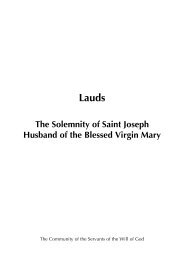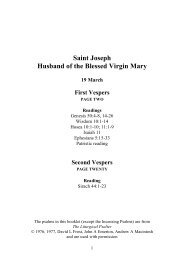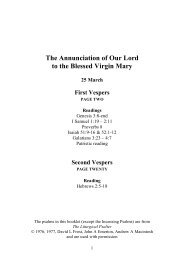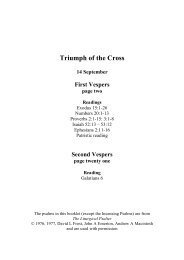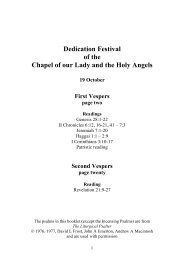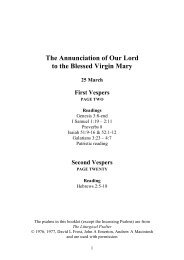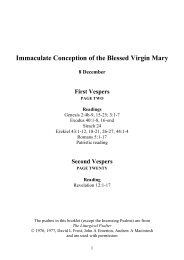Peace in the Face of War
You also want an ePaper? Increase the reach of your titles
YUMPU automatically turns print PDFs into web optimized ePapers that Google loves.
An eschatological understand<strong>in</strong>g <strong>of</strong> Christianity – <strong>the</strong> proclamation <strong>of</strong> <strong>the</strong><br />
good news, <strong>the</strong> ‘break<strong>in</strong>g <strong>in</strong>’ <strong>of</strong> God’s K<strong>in</strong>gdom – gave way to an historical<br />
understand<strong>in</strong>g. Christianity became a part <strong>of</strong> history. A long and agoniz<strong>in</strong>g<br />
process <strong>the</strong>n unfolded between <strong>the</strong> First and Second Com<strong>in</strong>gs <strong>of</strong> Christ.<br />
Historical Christianity proved itself accommodat<strong>in</strong>g to this world, a<br />
compromise with it, which was a travesty <strong>of</strong> true, eschatological Christianity<br />
– <strong>the</strong> Christianity <strong>of</strong> <strong>the</strong> End, <strong>the</strong> immediate presence <strong>of</strong> God’s K<strong>in</strong>gdom – and<br />
exchanged it for a Christianity <strong>of</strong> <strong>the</strong> personal salvation <strong>of</strong> souls. But we cannot<br />
deny that Christianity is essentially eschatological. There can be no distort<strong>in</strong>g<br />
<strong>of</strong> Christianity, and noth<strong>in</strong>g o<strong>the</strong>r than an eschatological Christianity.<br />
History has always been predom<strong>in</strong>antly militarist and full <strong>of</strong> wars. There<br />
have only been comparatively short periods <strong>of</strong> peace, <strong>of</strong> relative stability,<br />
which were readily overturned. History flows over volcanic soil, where lava<br />
is periodically erupt<strong>in</strong>g. History has to end, because history is war. There<br />
is an eschatological moment with<strong>in</strong> history, a k<strong>in</strong>d <strong>of</strong> <strong>in</strong>ner apocalypse <strong>of</strong><br />
history. This eschatological moment is acutely felt particularly <strong>in</strong> catastrophic<br />
epochs, <strong>in</strong> wars, <strong>in</strong> revolutions, <strong>in</strong> crises <strong>of</strong> civilization. <strong>War</strong> is<br />
predom<strong>in</strong>antly an historical phenomenon and, at <strong>the</strong> same time, <strong>the</strong> horrors<br />
<strong>of</strong> war give people a heightened eschatological sense <strong>of</strong> <strong>the</strong> approach <strong>of</strong> <strong>the</strong><br />
End. Similarly, eschatological feel<strong>in</strong>g is heightened <strong>in</strong> <strong>the</strong> lives <strong>of</strong> <strong>in</strong>dividual<br />
people <strong>in</strong> catastrophic experiences, <strong>in</strong> suffer<strong>in</strong>gs, <strong>in</strong> <strong>the</strong> closeness <strong>of</strong> death.<br />
<strong>War</strong> is pr<strong>in</strong>cipally a question <strong>of</strong> history, but at <strong>the</strong> same time, war is<br />
always connected with <strong>the</strong> End <strong>of</strong> history. We speak <strong>in</strong> conventional terms<br />
about apocalyptic eras and <strong>in</strong> such eras people are easily led astray by false<br />
prophecies <strong>of</strong> <strong>the</strong> com<strong>in</strong>g End <strong>of</strong> <strong>the</strong> world <strong>in</strong> a certa<strong>in</strong> year <strong>of</strong> historical time.<br />
But <strong>in</strong> a deeper sense all epochs are apocalyptic and <strong>the</strong> End is always near.<br />
Only <strong>in</strong> relatively peaceful times does <strong>the</strong> eschatological sense <strong>of</strong> people<br />
become dulled. The onset <strong>of</strong> an apocalyptic climate does not mean that <strong>the</strong><br />
end is chronologically near yet. Indeed, it is a mistake to understand <strong>the</strong> end<br />
<strong>of</strong> <strong>the</strong> world chronologically, to objectivize it <strong>in</strong> historical time.<br />
In <strong>the</strong> year 1000, people expected <strong>the</strong> end <strong>of</strong> <strong>the</strong> world. In <strong>the</strong> Reformation<br />
era, <strong>the</strong>re were strong eschatological attitudes. After <strong>the</strong> French Revolution<br />
<strong>in</strong> <strong>the</strong> Napoleonic era, <strong>the</strong> <strong>in</strong>tellectual life <strong>of</strong> Europe was saturated with<br />
apocalyptic and eschatological currents. They expected <strong>the</strong> imm<strong>in</strong>ent<br />
end <strong>of</strong> <strong>the</strong> world, <strong>the</strong> appear<strong>in</strong>g <strong>of</strong> Antichrist. Jung-Still<strong>in</strong>g [1740-1817]<br />
predicted that <strong>the</strong> world would end <strong>in</strong> 1836. There is someth<strong>in</strong>g tempt<strong>in</strong>g<br />
about premonitions and predictions <strong>of</strong> <strong>the</strong> imm<strong>in</strong>ent end <strong>of</strong> <strong>the</strong> world, and<br />
people <strong>of</strong>ten console <strong>the</strong>mselves with <strong>the</strong>m. They frequently experience<br />
it as <strong>the</strong> end <strong>of</strong> <strong>the</strong> world when an historic era that <strong>the</strong>y liked and with<br />
21



